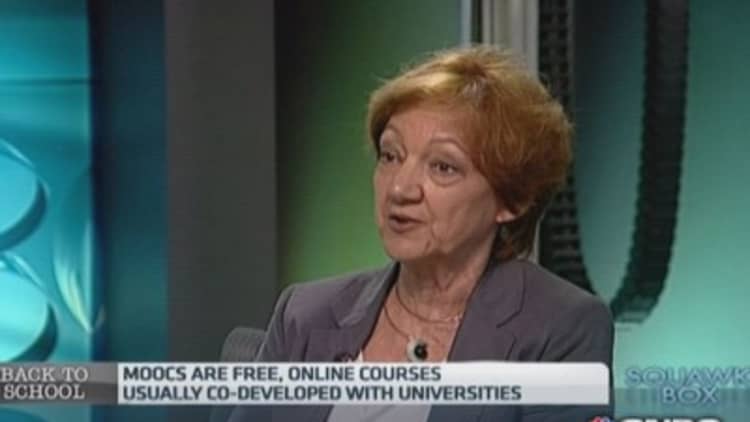Two years after they hit the headlines as the future of education and a challenge to costly universities, massive open online courses (MOOCs) are attracting increased business attention – in spite of failing to spark a mass exodus to online learning .
"We're seeing investments and deals made every day in this kind of area," said Simon Nelson, CEO of UK-based MOOC platform FutureLearn. But one of the most significant developments, he said, is that MOOCs are forging collaboration between universities, online media and big business.

Last week, British retailer Marks and Spencer announced they were teaming up with the University of Leeds to offer a MOOC on business innovation, housed on the FutureLearn site.
European platforms like FutureLearn are relatively new to the MOOC marketplace, following in the footsteps of well-established US sites Coursera, EdX and Udacity. All of them offer one-off online courses, often co-developed by prestigious universities, and are free to anyone with an internet connection.
Still, Nelson is one of the first to admit expectations for MOOCs were unrealistic from the start.
"Some of the early hype was overblown, and some of the expectation about this being a panacea for global educational problems, and educational divisions, were optimistic," he said.
Read MoreOnline courses trimbillions in personnel training
Professor Diana Laurillard of London Knowledge Lab agrees. By presenting MOOCs as a bundle of video lectures, student-lead web forums, quizzes and automated testing, developers have largely ignored educational experiments from the past 20 years, Laurillard argues.
"It's primitive and takes us back to a talking head," she said.
Still, MOOCs are catching the eye of C-suite executives, including David Richards. The WanDisco Founder and CEO is counting on MOOCs to disrupt the "stagnant" British education system and close the gap between industry and institutions.
"What makes them very interesting, especially ones from the likes of Stanford, is they incorporate theory and practice. And that's one of the big complaints about the British education system. MOOCs potentially fill that problem," Richards said.
"You make information ubiquitous, but involve people from industry."
Though you can't earn a degree through MOOC platforms, Richards said he's more interested in practical knowledge.
"Past the first job - sorry for all those at Oxbridge - it doesn't really matter in my industry. A few have advanced degrees in our offices in Silicon Valley but at an undergrad level. Then experience the critical thing," he said.
Some MOOC platforms do offer certificates of participation at the end some courses, though often at a small fee. Sites like FutureLearn are starting to give students the chance to gain full exams, invigilated at a physical centre — but again, at a price.
The "value-added" services are one way platforms are generating revenue. Others include business-to-business models, creating customized training courses for employers and professional bodies. As a guideline, Nelson said, course development costs could run anywhere from 20 to 50 thousand pounds.
Read MoreThe death of theclassroom as we know it
And it's the professional development space that MOOCs are best positioned to serve, according to Professor Laurillard. Though she has taught three MOOCs over the past three years, they've all been for working professionals.
The problem, she said, is that universities are essentially subsidizing professional training. All the while, tuition costs are rising.
"Universities have thrown millions into MOOCs without any return. And the numbers typically quoted to me are small," said Laurillard. "They it's marketing, but how much did those extra 50 or 100 students cost?"
"People need to take cool look at the business model.

